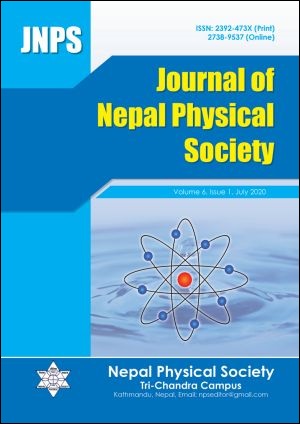Tungsten and Molybdenum Surfaces Exposed to Warm Deuterium Ion Plasma with Q-Nonextensive Distribution of Electrons
DOI:
https://doi.org/10.3126/jnphyssoc.v6i1.30517Keywords:
Particle obsorption, Particle reflection, Plasma facing materials, Plasma sheath, SputteringAbstract
This work is concerned with the effect of non-Maxwellian electrons and obliqueness of magnetic field on magnetized plasma sheath characteristics, in which plasma interacts with tungsten (W) and molybdenum (Mo) surfaces via non-neutral plasma sheath using two fluids model. It is assumed that the singly charged positive ions are treated as warm fluid whereas the electrons obey q-nonextensive distribution. It is found that the q-nonextensive distributed electrons and the temperature of ions affect the entrance velocity of positive ions, which is a key parameter in the plasma sheath formation. Also, the nonextensive parameter q affects the distribution of ions and electrons in the sheath region and their distributions explicitly related with the electrostatic potential variation. The parallel and perpendicular components of ions velocity are affected by the obliqueness of magnetic field. As the nonextensivity of electrons increases, the gradient in electric potential increases towards the wall and hence the impact energy also increases. The obliqueness of magnetic field and impact energy of ions is a key factor that determines the physical sputtering rate, particle reflection and absorption from the target surface. Furthermore, the probability of particle reflection coefficient from the W-surface is higher than that of Mo-surface.
Downloads
Downloads
Published
How to Cite
Issue
Section
License
All right reserved. No part of this Journal may be reproduced in any form or by any electronic or mechanical means, including information storage and retrieval system, without permission in writing from the publisher, except by a reviewer who may quote brief passage in a review. The views and interpretation in this journal are those of author(s) and they are not attributable to the NPS.




